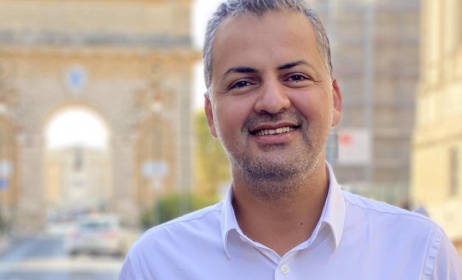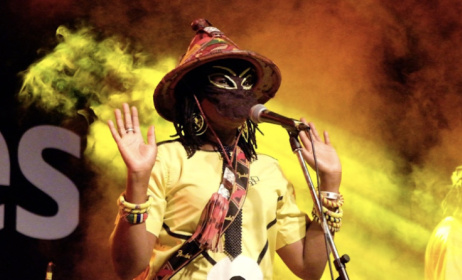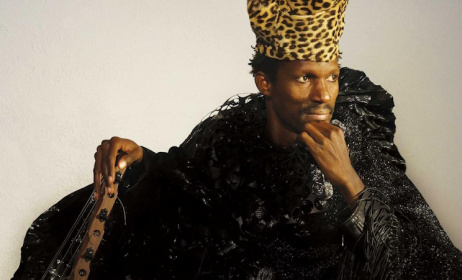Interview: Open Mic Productions managing director Nkateko Maluleke
Nkateko Maluleke is a South African music executive with a rich legal background in intellectual property and media law. Prior to becoming the managing director at Open Mic Productions, he was the head of legal and business affairs at Universal Music and the head of stakeholder relations at the Southern African Music Rights Organisation (SAMRO). Since his appointment at Open Mic Productions, Maluleke – with the help of the company’s co-founders, Molau Rammala and Lionel Jamela – has begun implementing strategies to expand the record label’s work outside of the country.
 Open Mic Productions managing director Nkateko Maluleke.
Open Mic Productions managing director Nkateko Maluleke.
Some of the artists associated with the label – among them Master KG, Makhadzi, Zanda Zakuza and Prince Benza – have been making big waves in Africa and around the world. Aside from helping artists sign endorsement deals, Maluleke believes in empowering musicians and has encouraged Open Mic Productions’ signees to take part in capacity-building workshops to further their careers.
Music In Africa spoke with Maluleke about his appointment, the challenges of running a black-owned record label in South Africa, royalty payments and the ‘Jerusalema’ spat between Master KG and Nomcebo Zikode.
MUSIC IN AFRICA: What have you achieved since joining Open Mic Productions?
NKATEKO MALULEKE: The beauty of it is that I got a clean canvas. I can’t say it’s an ‘achievement’; there are certain things that need to be put in place and also just making sure that we have a proper structure and not just provide lip service. Currently our focus is to ensure all the deals that are hanging are completed. We have done all the deals that we wanted Open Mic Productions to do and we are still looking for more. We have also started building strategic relationships with key stakeholders where music plays a major role – things that we wouldn’t have done in the past. So, for me, when somebody says achievement, it’s only been a few months, so it’s not so much achievements but we are living up to things that were once a dream for the team at Open Mic Productions, for myself as a leader and the artists as well.
We had a big workshop in February, where we got all our artists to be members of SAMRO, SAMPRA [the South African Music Performance Rights Association] and just getting all their paperwork in place. At Open Mic Productions we don’t just sign artists for exclusive recording and management deals; we empower them and I think if you speak of empowering artists as an achievement, we have successfully done that.
Where do you see Open Mic Productions in five years?
We want to make sure that we stand tall among the big boys. In five years, we plan on not referencing the past but still creating great music and looking at the future of the record label. We are doing deals that are strategic and we want to give more to our artists.
What are Molau Rammala and Lionel Jamela’s contributions to the day-to-day running of the label?
They are still big on A&R, which they do really well. They’ve stepped back on the day-to-day running of the business, which is where I come in strong and handy. They still strategically contribute to the drive and where we see the business going, but now their big focus is A&R and there are also busy doing live shows. I worry about focus, in terms of the deals and projects we can get ourselves involved in. But we are also looking at building strategic relationships on the continent, and that’s basically how we’ve defined the contribution of the two founders and my role as the current managing director.
What challenges does Open Mic Productions face and what steps are being taken to overcome them?
Challenges will always be there, like breaking stereotypes about how a black-owned business should look like – and we’ve challenged all of that. We’ve gone on to prove that we are not just a black-owned and black-run record label. We’ve gone into doing things that I think the big boys are probably taking notes of. But also, we are not in this to take out the big boys in the industry. The skills in our business is what would see us nicely occupying our own space without taking attention from any of the old organisations. Every challenge that comes is welcome; it’s a learning curve and it also demonstrates how we do business. So there have been challenges, but they are not big enough to dim our lights and say, ‘We can’t work because we’re challenged.’ I take it as part of day-to-day business. The success that we’ve had as a record label should naturally attract challenges.
What services does the label provide its artists?
We do what we call 360 deals, which is a comprehensive recording and publishing rights service. We also do management, sourcing and securing of endorsement deals for them. But I think one thing that we pride ourselves on at Open Mic Productions is providing our artists with not just recording deals but also information. So they understand the full value chain, such as where do certain rights sit? Where do certain royalties come from? We’ve managed to do that and we continue to look at ways in which we can contribute to their lives besides just recording music and making a sale.
How many artists are signed to Open Mic Productions?
We are at about 35 and counting. What we’re trying to do now is expand the focus. When somebody asks about Open Mic Productions, it’s easy to speak about Makhadzi and Master KG. It’s part of my plan with the team to unleash more. You will see traction in the next few months in terms of the other artists who are signed to Open Mic Productions. We have a great A&R team that’s focusing not only on South African artists but expanding across the continent to do more collaborations and remove the stereotype that we are a record label focusing only on music from Limpopo province. We are slowly dispelling that: we are a record label that does music in the country, continent and the world.
Local media reported that Master KG and Nomcebo Zikode were fighting over ownership of the hit song ‘Jerusalema’. Who owns the song and how was the dispute resolved?
The song is owned by Open Mic Productions. Remember, we own the master recordings as a record label. The two artists are signed to Open Mic Productions, so it means that the agreement is still in place and that the collaboration happened within a the ambit of the recording contracts, which are sitting with Open Mic Productions. There is no squabble between the two artists. One artist was badly advised on how corporate ownership in relation to ‘Jerusalema’ works.
Who is this ‘one’ artist?
Nomcebo. I can speak openly about that. We had issues and we are still open as Open Mic Productions to have a discussion with her to settle this issue in the best way possible. I personally don’t feel or believe in destroying or fighting with artists. There are my colleagues in the profession and we wouldn’t have Open Mic Productions without our artists. So for me, it’s very bad if I was to sit and say the plan is to destroy. No! We are still open to having a conversation with Nomcebo and to advise her properly, because when I joined Open Mic Productions, I saw the advice that was given to her in relation to the master recordings. I saw all sorts of things and my feeling was that I wish we had sat down earlier.
I’m very knowledgeable on this subject matter. Yes, my background is legal, so some of the things that happened, as far as she’s concerned, shouldn't have happened the way they did. I don’t want to pull the race card, but I also felt that it’s played out in public that the artists are fighting amongst each other, whereas my strongest belief is that we were able to sit down as black people and resolve our own issues without being seen as hooligans. It pains me when the story remains as if ‘there was a squabble, there was stealing of a song’ – or whatever it is that was said in public. We all know the truth and we have gone on to answer as Open Mic Productions where allegations were made, and I was part of those discussions.
Who is the beneficiary of the ‘Jerusalema’ royalties?
All parties benefit. The sadness behind the success of ‘Jerusalema’ is that it attracted all sorts of things, the good and the bad. As much as the song did very well, it also brought a lot of negativity. I must tell you that she’s not the only person who has come forward to say that they own copyrights to ‘Jerusalema’. I set with a legal letter towards the end of last year where two boys claimed ownership of the song, and I remember that when the team brought it to me, I said, ‘I'm glad this came out, can the real owner of ‘Jerusalema’ stand up?’ Because there’s three, surely one of them should own the stake? So I’m not perplexed by allegations, I’m perplexed by how we’re attacked for something so basic in the music recording space. Something so clear. It worries me, it’s almost as if we’ve gained an enemy in Nomcebo and I don’t believe that, it’s not necessary.
What action did the company take to keep the lights on during the COVID-19 pandemic?
We are so lucky that by the time we got to COVID-19, our artists were not struggling, they had done really well. I’m grateful that when I joined, I wasn't joining a sad group or a sad party. But it was a business that said, ‘This is where we are, how do we grow moving forward?’ Most of our big names are doing well and it was a bit easier to start empowering the up-and-coming names that are at the label. We are grateful that the country is opening up and that we are able to do stuff on the continent. And I must say, even during the past two to three months when the rules were not so relaxed in the country, we were gigging in Angola, Nigeria and all parts of the continent. We’re doing okay. Internationally, where the rules are relaxed, we are getting gigs.
What factors do you consider before signing an artist to Open Mic Productions?
We are looking for star quality and that’s why we’ve attracted so much fame as a record label. We’ve attracted quality and stability in the sense that we take time. We’ve spent a lot of time going to places where people don’t necessarily go to pick out the best talent, whether it’s in the heart of Pretoria or at a shebeen. We attract talent that is not so obvious and we groom it based on the fact that we’ve seen the talent that we are looking for. It’s like a family recipe that we can give you, but we have to hold the ingredients.
What’s your take on the music royalty space in Africa?
It’s a challenging area. The information is there, we’ve got the right people, but we’re just not utilising the resources the way we should. There are organisations that are run well and I’ll give the example of SAMPRA; I’ve spent a lot of time with SAMPRA, it’s run very well. I can commend Tiyani Maluleke and Pfanani Lishivha for the amazing work that they do. I’ve seen them taking the backlash spear for doing so well, I’ve seen a lot of that. I’ve seen CAPASSO [the Composers, Authors and Publishers Association], it’s run very well. I can give credit to Jotam Matariro and his team. I’ve also seen him taking backlash for doing well. It's a very challenging space. Given the right support, resources and mindset, I think it can change, because I’ve seen that it can work, especially with the two examples that I’ve given.
Any last thoughts?
I think my parting shot is that we need to stop assuming that things are a certain way with minimal facts, and I think that’s how a lot of mistakes and scandals come about in the music industry. If you really look at it, we are a phone call away from each other. If somebody is not sure about something, they can call. But also, just because Open Mic Productions is a black business, it doesn’t mean that all it does is wake up every day and make mistakes. No. We spend a lot of time cleaning up and making sure that what we do occupies space in this industry. But we are not here to destroy, steal or take away from such a beautiful industry, where we believe that we can make our own money. We are here to make it work for everyone. We run our own race, we want to help where we can. So I’m always the first to say that if there’s a small record label that wants to tag along or come for some sort of mentorship, I'm always open to that, because it’s nice when we all win. But it doesn’t make sense when one person is winning. We know there’s enough for everyone.
























Commentaires
s'identifier or register to post comments